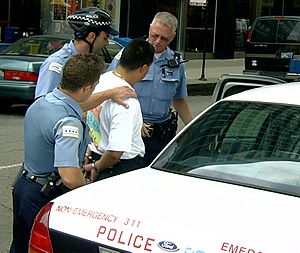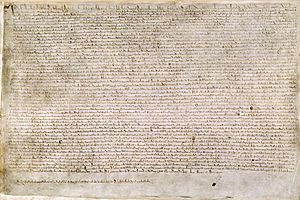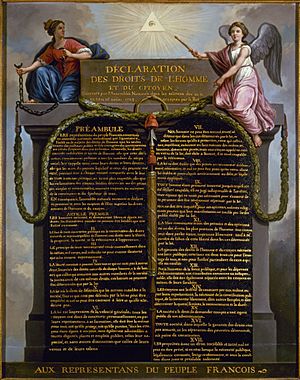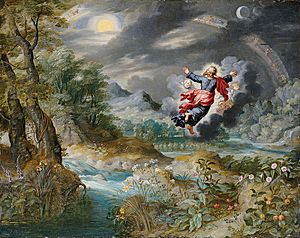Rights facts for kids
A right is something a person has that people think should not be taken away from them. A right is different than a privilege, which is something that must be earned.
Contents
Examples
- People may also have a "right to property". That means that people cannot steal things from each other.
- In many countries people have a "right to free speech", which means other people cannot stop them from saying what they want to.
Definitional issues
One way to get an idea of the multiple understandings and senses of the term is to consider different ways it is used. Many diverse things are claimed as rights:
A right to life, a right to choose; a right to vote, to work, to strike; a right to one phone call, to dissolve parliament, to operate a forklift, to asylum, to equal treatment before the law, to feel proud of what one has done; a right to exist, to sentence an offender to death, to launch a nuclear first strike, to carry a concealed weapon, to a distinct genetic identity; a right to believe one's own eyes, to pronounce the couple husband and wife, to be left alone, to go to hell in one's own way.
There are likewise diverse possible ways to categorize rights, such as:
Who is alleged to have the right: Children's rights, animal rights, workers' rights, states' rights, the rights of peoples. What actions or states or objects the asserted right pertains to: Rights of free expression, to pass judgment; rights of privacy, to remain silent; property rights, bodily rights. Why the rightholder (allegedly) has the right: Moral rights spring from moral reasons, legal rights derive from the laws of the society, customary rights are aspects of local customs. How the asserted right can be affected by the rightholder's actions: The inalienable right to life, the forfeitable right to liberty, and the waivable right that a promise be kept.
There has been considerable debate about what this term means within the academic community, particularly within fields such as philosophy, law, deontology, logic, political science, and religion.
Natural versus legal
- Natural rights are rights which are "natural" in the sense of "not artificial, not man-made", as in rights deriving from human nature or from the edicts of a god. They are universal; that is, they apply to all people, and do not derive from the laws of any specific society. They exist necessarily, inhere in every individual, and can't be taken away. For example, it has been argued that humans have a natural right to life. These are sometimes called moral rights or inalienable rights.
- Legal rights, in contrast, are based on a society's customs, laws, statutes or actions by legislatures. An example of a legal right is the right to vote of citizens. Citizenship, itself, is often considered as the basis for having legal rights, and has been defined as the "right to have rights". Legal rights are sometimes called civil rights or statutory rights and are culturally and politically relative since they depend on a specific societal context to have meaning.
Some thinkers see rights in only one sense while others accept that both senses have a measure of validity. There has been considerable philosophical debate about these senses throughout history. For example, Jeremy Bentham believed that legal rights were the essence of rights, and he denied the existence of natural rights; whereas Thomas Aquinas held that rights purported by positive law but not grounded in natural law were not properly rights at all, but only a facade or pretense of rights.
Positive versus negative
In one sense, a right is a permission to do something or an entitlement to a specific service or treatment from others, and these rights have been called positive rights. However, in another sense, rights may allow or require inaction, and these are called negative rights; they permit or require doing nothing. For example, in some countries, e.g. the United States, citizens have the positive right to vote and they have the negative right to not vote; people can choose not to vote in a given election without punishment. In other countries, e.g. Australia, however, citizens have a positive right to vote but they don't have a negative right to not vote, since voting is compulsory. Accordingly:
- Positive rights are permissions to do things, or entitlements to be done unto. One example of a positive right is the purported "right to welfare."
- Negative rights are permissions not to do things, or entitlements to be left alone. Often the distinction is invoked by libertarians who think of a negative right as an entitlement to non-interference such as a right against being assaulted.
Though similarly named, positive and negative rights should not be confused with active rights (which encompass "privileges" and "powers") and passive rights (which encompass "claims" and "immunities").
Individual versus group
The general concept of rights is that they are possessed by individuals in the sense that they are permissions and entitlements to do things which other persons, or which governments or authorities, can not infringe. This is the understanding of people such as the author Ayn Rand who argued that only individuals have rights, according to her philosophy known as Objectivism. However, others have argued that there are situations in which a group of persons is thought to have rights, or group rights. Accordingly:
- Individual rights are rights held by individual people regardless of their group membership or lack thereof.

- Group rights have been argued to exist when a group is seen as more than a mere composite or assembly of separate individuals but an entity in its own right. In other words, it's possible to see a group as a distinct being in and of itself; it's akin to an enlarged individual, a corporate body, which has a distinct will and power of action and can be thought of as having rights. For example, a platoon of soldiers in combat can be thought of as a distinct group, since individual members are willing to risk their lives for the survival of the group, and therefore the group can be conceived as having a "right" which is superior to that of any individual member; for example, a soldier who disobeys an officer can be punished for a breach of obedience. But there is another sense of group rights in which people who are members of a group can be thought of as having specific individual rights because of their membership in a group. In this sense, the set of rights which individuals-as-group-members have is expanded because of their membership in a group. For example, workers who are members of a group such as a labor union can be thought of as having expanded individual rights because of their membership in the labor union, such as the rights to specific working conditions or wages. As expected, there is sometimes considerable disagreement about what exactly is meant by the term "group" as well as by the term "group rights."
Politics

Rights are often included in the foundational questions that governments and politics have been designed to deal with. Often the development of these socio-political institutions have formed a dialectical relationship with rights.
Rights about particular issues, or the rights of particular groups, are often areas of special concern. Often these concerns arise when rights come into conflict with other legal or moral issues, sometimes even other rights. Issues of concern have historically included labor rights, LGBT rights, reproductive rights, disability rights, patient rights and prisoners' rights. With increasing monitoring and the information society, information rights, such as the right to privacy are becoming more important.
Some examples of groups whose rights are of particular concern include animals, and amongst humans, groups such as children and youth, parents (both mothers and fathers), and men and women.
Accordingly, politics plays an important role in developing or recognizing the above rights, and the discussion about which behaviors are included as "rights" is an ongoing political topic of importance. The concept of rights varies with political orientation. Positive rights such as a "right to medical care" are emphasized more often by left-leaning thinkers, while right-leaning thinkers place more emphasis on negative rights such as the "right to a fair trial".
Further, the term equality which is often bound up with the meaning of "rights" often depends on one's political orientation. Conservatives and libertarians and advocates of free markets often identify equality with equality of opportunity, and want equal and fair rules in the process of making things, while agreeing that sometimes these fair rules lead to unequal outcomes. In contrast, socialists often identify equality with equality of outcome and see fairness when people have equal amounts of goods and services, and therefore think that people have a right to equal portions of necessities such as health care or economic assistance or housing.
History

The specific enumeration of rights has differed greatly in different periods of history. In many cases, the system of rights promulgated by one group has come into sharp and bitter conflict with that of other groups. In the political sphere, a place in which rights have historically been an important issue, constitutional provisions of various states sometimes address the question of who has what legal rights.
Historically, many notions of rights were authoritarian and hierarchical, with different people granted different rights, and some having more rights than others. For instance, the right of a father to be respected by his son did not indicate a right of the son to receive something in return for that respect; and the divine right of kings, which permitted absolute power over subjects, did not leave much possibility for many rights for the subjects themselves.
In contrast, modern conceptions of rights have often emphasized liberty and equality as among the most important aspects of rights, as was evident in the American and French revolutions.
Important documents in the political history of rights include:
- The Persian Empire of ancient Iran established unprecedented principles of human rights in the 6th century BC under Cyrus the Great. After his conquest of Babylon in 539 BC, the king issued the Cyrus cylinder, discovered in 1879 and seen by some today as the first human rights document.
- The Constitution of Medina (622 AD; Arabia) instituted a number of rights for the Muslim, Jewish, camp followers and "believers" of Medina.
- Magna Carta (1215; England) required the King of England to renounce certain rights and respect certain legal procedures, and to accept that the will of the king could be bound by law, after King John promised his barons he would follow the "law of the land". While Magna Carta was originally a set of rules that the king had to follow, and mainly protected the property of aristocratic landowners, today it is seen as the basis of certain rights for ordinary people, such as the right of due process.
- The Declaration of Arbroath (1320; Scotland) established the right of the people to choose a head of state (see popular sovereignty).
- The Henrician Articles (1573; Poland-Lithuania) or King Henry's Articles were a permanent contract that stated the fundamental principles of governance and constitutional law in the Polish-Lithuanian Commonwealth, including the rights of the nobility to elect the king, to meet in parliament whose approval was required to levy taxes and declare war or peace, to religious liberty and the right to rebel in case the king transgressed against the laws of the republic or the rights of the nobility.
- The Bill of Rights (1689; England) declared that Englishmen, as embodied by Parliament, possess certain civil and political rights; the Claim of Right (1689; Scotland) was similar but distinct.
- The Virginia Declaration of Rights (1776) by George Mason declared the inherent natural rights and separation of powers.
- The United States Declaration of Independence (1776) succinctly defined the rights of man as including, but not limited to, "Life, liberty, and the pursuit of happiness" which later influenced "liberté, égalité, fraternité" (liberty, equality, fraternity) in France. The phrase can also be found in Chapter III, Article 13 of the 1947 Constitution of Japan, and in President Ho Chi Minh's 1945 declaration of independence of the Democratic Republic of Vietnam. An alternative phrase "life, liberty and property", is found in the Declaration of Colonial Rights, a resolution of the First Continental Congress. Also, Article 3 of the Universal Declaration of Human Rights reads, "Everyone has the right to life, liberty and security of person".
- The Declaration of the Rights of Man and of the Citizen (1789; France), one of the fundamental documents of the French Revolution, defined a set of individual rights and collective rights of the people.
- The Virginia Statute for Religious Freedom (1785; United States), written by Thomas Jefferson in 1779, was a document that asserted the right of man to form a personal relationship with God free from interference by the state.
- The United States Bill of Rights (1789–1791; United States), the first ten amendments of the United States Constitution specified rights of individuals in which government could not interfere, including the rights of free assembly, freedom of religion, trial by jury, and the right to keep and bear arms.
- The Constitution of Poland-Lithuania (1791; Poland-Lithuania) was the first constitution in Europe, and second in the world. It built upon previous Polish law documents such as the Henrician Articles, as well as the US constitution, and it too, specified many rights.
- The Universal Declaration of Human Rights (1948) is an overarching set of standards by which governments, organisations and individuals would measure their behaviour towards each other. The preamble declares that the "...recognition of the inherent dignity and of the equal and inalienable rights of all members of the human family is the foundation of freedom, justice and peace in the world..."
- The European Convention on Human Rights (1950; Europe) was adopted under the auspices of the Council of Europe to protect human rights and fundamental freedoms.
- The International Covenant on Civil and Political Rights (1966), a follow-up to the Universal Declaration of Human Rights, concerns civil and political rights.
- The International Covenant on Economic, Social and Cultural Rights (1966), another follow-up to the Universal Declaration of Human Rights, concerns economic, social and cultural rights.
- The Canadian Charter of Rights and Freedoms (1982; Canada) was created to protect the rights of Canadian citizens from actions and policies of all levels of government.
- The Charter of Fundamental Rights of the European Union (2000) is one of the most recent proposed legal instruments concerning human rights.
Related pages
See also
 In Spanish: Derechos para niños
In Spanish: Derechos para niños



